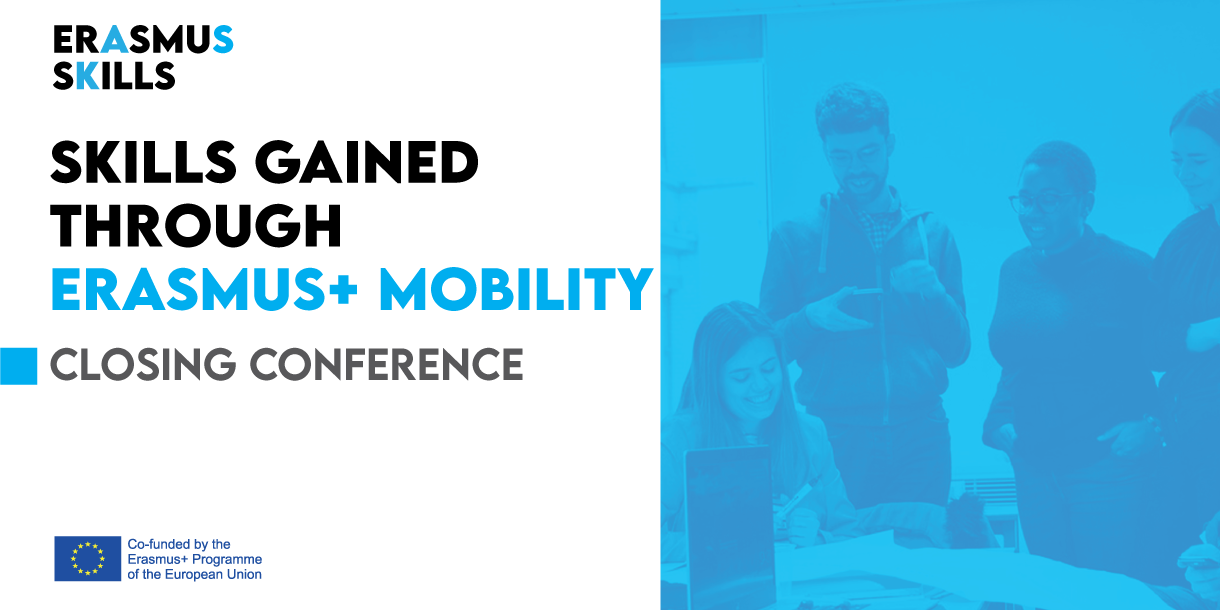
The closing conference of the Erasmus Skills project took place online on February 25th, 2021. The event focused on the support for students before, during and after their mobility experience, as well as the support university teachers and practitioners can provide to Erasmus+ students for nurturing a more conscious soft skills acquisition.
During the virtual event, a panel of experts in the field of higher education and mobility discussed how to assess the skills gained through international student mobility, side by side with how to translate these gained competencies into the curriculum and career development of students.
The Erasmus Skills project is coordinated by Universidad Autónoma de Madrid in partnership with the Erasmus Student Network (ESN), Aristotle University of Thessaloniki, European University Foundation (EUF), Expertise in Labour Mobility (ELM), and Ghent University. The core of the project is to provide digital tools to ensure that students are more aware of the process they go through while on exchange and the impact this has on their acquired knowledge, skills and attitudes (KSA), their personal and professional development and enables them to put all this into words.
The majority of volunteers in ESN have been on academic or some other type of mobility themselves and because of this, we know first hand the benefits of this experience on the development of an individual. This is why ESN is involved in projects that highlight the benefits of mobility, and the impact they have on an individual’s personal and professional development, such as Erasmus Skills, SocialErasmus+, and ErasmusJobs.
The final conference of the Erasmus Skills project was opened by Wim Gabriels, Policy and Project Officer at ESN International, and Dr Carmela Calés, Vice-rector International Affairs at Universidad Autónoma de Madrid. The two highlighted the need to identify values and skills that both students and staff get from existing and new mobility schemes and encouraged the creation of new models of mobility through the European University Alliances.
Dr Adriana Perez Encinas of Universidad Autónoma de Madrid, also the Project coordinator of Erasmus Skills, presented the first outcome of the project, the Guide for Practitioners, which creates a theoretical framework, based on the competences - knowledge, skills and attitudes - to be gained from an Erasmus+ experience.
The document provides guidelines to help universities support the personal development of students that go on learning mobility, something Dr Perez Encinas believes is crucial in order to help students make sense of the professional skills and competences they have developed while abroad.
The project’s second output is the self-assessment tool for students to fill in the assessment before and after mobility, through which they will be able to see how the mobility impacted them. The Erasmus Skills self-assessment questionnaires are also integrated into the Erasmus+ App, in the Mobility Journey section.
Nannette Ripmeester, Director of Expertise in Labour Mobility, led a student panel in which six alumni of various mobility schemes shared their experiences and reflected on the biggest challenges and learning outcomes. Among many, they emphasised the problem-solving skills that young people inevitably develop while abroad, in addition to adaptability and intercultural communication.
They were followed by Dr Darla K. Deardorff, Executive Director of the Association of International Education Administrators (AIEA), as well as a Research Scholar at Duke University, USA and an EAIE trainer. The keynote speaker echoed what the student panel talked about, reiterating that reflection is the key to development. Dr Deardorff discussed in-depth the ways in which one can expand intercultural competence and encouraged universities to introduce more peer-to-peer assessments and discuss students’ expectations.
When asked how can intercultural competence development be offered to those who cannot be mobile, she pointed to the UNESCO’s manual for developing intercultural competencies, available in 5 languages. The manual implies the use of little to no resources by someone who does not need to have a dedicated degree in order to guide the participants through the learning process.
The conference was wrapped up with a panel discussion with international education experts, who talked about the recognition competences and skills gained through mobility. All of them alumni of various mobility programmes, they reflected on their personal and professional development brought on by these exchanges, but also the challenges.
Tajana Mohnacki, Vice President of the Erasmus Student Network, observed the changes she went through during her time abroad only when returning home and friends pointed them out. She underlined that the support from universities after the exchange can help students make sense of their growth, by organising meetings for students after they come back, to guide them in this process.
For Pauline Boivin, Project and Policy Coordinator at the Lifelong Learning Platform, an internship in South America was not included in her university diploma and the university offered little support to understand and use the skills gained, which is why she sees the Erasmus Skills project as essential in bridging this gap.
Björn Nyström, Project Coordinator at Uppsala University, builds on what Boivin talked about, and underscored how crucial it is that universities and students work together to develop the adequate language with which students can “express the depths of that personal development”. In the current project he is working on, they are gathering career counsellors and psychologists with the aim to help students identify and express the skills they acquire while abroad.
Anne Rosier, a researcher at Nuffic, the Dutch organisation for internationalisation in education, concurred and explained how having a conversation with students before their mobility where they can share their expectations, what they would like to come out with, and how this complements their goals and ambitions can enhance the learning curve of the students.
The Erasmus Skills team organised post-conference workshops on March 2nd and March 4th 2021, which dug deeper into the topic of supporting students throughout their mobility experience and how to embed the learning objectives and skills gained through mobility more closely into the curriculum.

Follow ESN